- Home
- Neal Asher
Dark Intelligence Page 12
Dark Intelligence Read online
Page 12
“Okay,” I stepped into the refectory and braced myself. “Power them up.”
My weight increased gradually, as things fell to the deck—a cup containing the tar-like remains of coffee, a palm-top, a plate and various objects that looked like dehydrated food. I just about heard the noise they made, carried by the thin remaining atmosphere. As if reading my mind, Flute spoke up again.
“I can also restore the air supply,” it said.
“I don’t think so,” I replied, noting that what looked like a stain on one wall was slowly shifting like some shadowy slug. The light must be powering up nanobots capable of photo-activation and I really didn’t fancy the idea of breathing them in. “I would rather you concentrated on finishing your diagnostic and also pulse-wipe all onboard nano- and microbots. Do you have any of the larger maintenance robots running?”
“Certainly,” Flute replied.
“Sanitizers and surface maintenance?”
“All are available.”
“Then I’d be happier if you got on that now. I want a clean sweep of all nano- and microbots. Plus auto-manufacture of them must shut down until we can be utterly sure of what we’re making.”
“As you wish,” Flute replied, then quickly added, “May I ask a question?”
“You just did.”
“Another one, then.”
“Go ahead,” I replied, stepping back into the corridor leading to the four cabins and feeling a little worried about my ship’s mind.
“Why am I serving a human?” it asked.
“Because, through an intermediary, I bought you from the prador and you have since been programmed to obey me, and me alone.”
“But we are enemies,” said Flute.
That gave me pause. Flute must have undergone the traumatic loss of its body during the war to end up as a kamikaze mind. But had it been somnolent since then? Its apparently enhanced verbal dexterity would indicate otherwise.
“The war ended a century ago,” I tried.
After a pause Flute replied, “The new king ended the war.”
“So it did,” I said. “Now I would like to ask you a question.” I waited but Flute remained silent, so I continued, “You are unlike any other second-child mind I’ve encountered. You have nuances of speech and responses unexpected in such a mind. Do you have any explanation as to why that is?”
Again a pause, then a tentative, “I am old.”
“You have been active since being placed in that shell?”
“Father activated us after the war.”
Interesting.
“Your father?”
“Father-Captain Sverl. He allowed us sensory access and he spoke to us.”
Even more interesting. This didn’t sound like the behaviour of any prador father-captain I’d heard of before. Second-child minds were considered disposable assets to them—no more important than sub-AI computing might be to a Polity citizen. It had also always been the case, as I understood it, that such a mind possessed a very limited ability to learn. Certainly such could acquire data, but what they did with it supposedly didn’t change them very much.
“After your encasement, did this Sverl make any further physical alterations to you?”
“Our limited conversation annoyed him,” Flute stated.
“And?”
“He gave us additional processing to improve it.”
I shut my eyes and immediately started checking my aug for my initial scans of Flute. In a moment, I saw what I had missed at first—just a few decimal points. Flute’s processing space wasn’t in the usual gigabyte range but extended into the terabytes. This Sverl had made Flute much like some of the early human cyborgs. It was a flash-frozen but electrically active organic brain, which also allowed additional processing, the ability to learn and grow that AI crystal possessed.
“Well, I’m glad he did,” I lied.
“Thank you,” Flute replied, which was of course also a strange thing to come from the mind of a prador second-child. I would definitely have to run more checks and tests to be sure I had not bought myself a prador Trojan horse.
The first cabin was open, and a glance inside at the spartan furnishings and lack of a bed told me straight away that this one belonged to the Golem. Why it had required a cabin at all was puzzling, since it was made before humans could upload to a Golem chassis and so perhaps require human “space.” The other three doors were locked and I felt no inclination to ask Flute to open them, sure that the moment I stepped inside I would remember occupying them. As I pressed on the last one, a hatch opened at the end of the corridor and a maintenance robot emerged. The thing resembled the carapace of a two-foot-long blue beetle, mounted on a hovercraft cushion. It immediately moved to one side, tilted up to reveal glittering convolutions on its underside and attached itself to the wall. With a low humming, it proceeded to motor along it. I watched for a moment, seeing the mottled grey of the wall turning to pure white behind it. It was obviously killing off the microculture of bots there and removing them—a process that would involve a lot more than simple suction.
When it was about five feet along its perfectly straight path, more robots followed it out of the hatch. These were mobile black hemispheres the size of half-apples; white plastic centipedes; multi-limbed small-repair creations similar to mantids, spiders and shield bugs—all gleaming like polished chrome. Still feeling somewhat wary, I turned away, heading back to the bridge and the ship’s cortex. I wanted to inspect the object I’d seen lying on the floor near Flute—perhaps just as deeply as that ammonite fossil aboard the Moray Firth.
Once again, I saw the other dead crewmembers in the tunnel and once again felt my skin crawling.
“Flute,” I said, as I approached the ship’s cortex. “I want you to remove the three corpses, pulse-wipe any bots on or in them, seal them in mono-cloth and store them. I presume there’s a refrigerated area?”
“Certainly,” Flute replied. “There is a zero-store for food items, bio-electronics and casualties.”
“Put them there, but first scan them for memplants.”
“I have already scanned them—they have none.”
I had considered ejecting them straight out of a waste lock but, even after all this time, there might still be someone around who cared enough to know what had happened to them. They might still merit some sort of ceremonial disposal. If not that, then I could hand them over to the Polity so that certain boxes could be ticked and files closed. Whatever—I just didn’t want them giving me that hollow-eyed glare every time I walked past.
The ship’s cortex was tidier now. Flute had obviously had robots in here vacuuming up all the crystal and other debris, and disassembling some of the tools Penny Royal had made. However, the Golem had only been moved back and rested against one wall. The spine—that long piece of dark glass with its sinister attached tentacle—had been decidedly left alone. It still lay on the floor where last I’d seen it and, while most of the floor had been polished to a gleam, the area around and underneath it had been left strictly alone too.
“Flute, why haven’t you moved this object and cleaned this area of floor?” I asked, pointing down at the thing.
After a long pause Flute replied, “I do not understand it.”
“What do you mean?”
“It is in either an active or pre-active state, like the bots aboard this ship, and scanning reveals quantum computing and picotech processes. It may be dangerous, so I was planning to ask you for instructions on how to proceed.”
I peered down at the thing, then squatted to inspect it more closely. Why, I have no idea, because I wouldn’t be seeing any picotech. While I was in that position I caught a flicker of movement out of the corner of one eye. Something was moving towards me, fast. I turned just as the Golem, on the end of the thick tentacle that had replaced it from the waist down, reached me. Its altered hand struck my space suit helmet hard, lifting me up off the floor and depositing me on my back. My suit immediately reported a leak and I
realized two things at once. The helmet had just saved my life and, were it not for the Golem’s lack of legs, I still wouldn’t have made it. Had the Golem been able to brace itself against the floor, the full force of its blow would have smashed open both my helmet and my head.
Propelled away from me by the force of its blow, the Golem slowed to a stop in mid-air, swaying at the end of its tentacle, its head swinging from right to left. That strange binocular device that had replaced its eyes had perhaps left it blind in the human spectrum. It was probably for very close work: microscopic, maybe even nanoscopic. With its head movements it appeared to be trying to locate me by sound. Any moment now it would hear me breathing, or even detect the beat of my heart. I had to respond or I was dead.
I wouldn’t be able to reach the exit before it got to me and, really, there was no knowing how long its tentacle could extend. It might even be able to get some way out of the ship’s cortex. I wasn’t armed, because quite stupidly I’d left the laser carbine in the human bridge area along with the various tools I’d brought. In the end I only had one option and it probably wouldn’t work. In that moment I was glad they’d reinserted my memplant on Earth, because this situation was bad, very bad. The chances of an unarmed human surviving a homicidal Golem attack were remote.
The Golem abruptly froze, then slowly revolved to face me. It shifted its head from side to side, then up and down, to centre on me completely and began opening and closing its branched hands. This was it. I had to act now. I rolled and grabbed, then lifted and levelled Penny Royal’s discarded spine, and braced its base against the floor. The Golem came down on me like a hammer, as I’d hoped, just as I aimed the spine’s tip straight at its chest where its crystal should reside.
The impact through the spine dented the floor underneath me. The Golem’s hands swung in and grabbed, one tearing the visor from my helmet and the other coming down on my shoulder, which I felt break like a snail under heel. Then the spine was snatched from my hands, the Golem shooting straight upwards to slam into the ceiling at the full extension of its tentacle, the spine right through its chest. I had no idea how the spine was made, to punch through ceramal like that, but was grateful for it. I rolled, put a hand down to push myself upright and headed for the exit, noting the bloody handprint I’d left on the floor. Checking my gauntlets, I saw that they’d been sliced to ribbons and the hands underneath weren’t much better. Then I glanced back from the exit.
The Golem was groping along the ceiling as if searching for something by feel. I headed out of there, not waiting to see if it would expire. I had problems enough. My hands and shoulder were starting to hurt badly, and my suit was pumping its air straight out of its visor hole in an effort to keep me alive. My face felt bloated already by the drop in air pressure. Out in the corridor I kept going, starting to stumble, and clamped down on the urge to vomit. Finally reaching the human bridge, I realized I wouldn’t even be able to pick up the laser carbine.
“Flute,” I said. The suit radio responded with a series of buzzes, but I could just hear a voice.
“Flute,” I said again and this time I could just hear the words, distant and tinny, and realized I was hearing them from the PA system through the thin air.
“I am restoring air supply,” the ship mind told me.
Great, I thought, but wondered if it was Flute who had just tried to kill me, especially after what I’d learned about the second-child mind. Surely the Golem was merely a tool—an extension of the mind that previously occupied Flute’s position?
“I need medical attention,” I said.
“I have initiated an autodoc in cabin one,” Flute replied.
Did I want to subject myself to the attentions of an autodoc that Flute could control?
“What happened … with the Golem?” I asked.
“I don’t know,” Flute replied. “It was powered down until just before it attacked. It bypassed the shutdown, but I do not understand why it attacked. I have just physically cut its power supply and, since its own has been removed, it is now inanimate.”
Did I believe that? What were my options? I could probably struggle out of my suit and use a spare suit from one of the crew, but even that was risky. Firstly, any suit I found here would be a century old and possibly faulty. Secondly, if Flute was out to kill me, my donning such a suit would be a perfect opportunity. If it had sent that Golem against me, then it could easily reprogram a suit to either shut down its air, to alter the mix, or even to take command of its joints if it was a powered version. I realized I had to trust it. The actions of that Golem probably had more to do with Penny Royal than a second-child mind programmed for loyalty to me.
I stumbled through to the cabins, noting the door to one of them, previously closed, was now open. The moment I stepped inside, the door quickly closed behind me, which upped my paranoia but was probably so air pressure could be raised quickly within. The autodoc was a crawler—not pedestal mounted. It had come out of an aseptic store in the wall and was now down on the floor below it. I recognized it as the kind usually deployed on battlefields to search out survivors amidst casualties. It consisted of two linked beetle-like sections, a sensor head with antennae, pheromone sniffers, and short- and long-range eyes.
“Can you remove your suit?” Flute enquired.
I tried, but my hands had frozen up. “No.”
“Lie down on the bed,” my ship mind instructed.
I did as bid, slowly, my shoulder agonizing now. I heard the autodoc scuttling, then felt the weight of its front section rest against the edge of the bed beside me. Glancing over, I caught a look at its underside: the polished insectile legs, the folded surgical cutlery, the peeking bone-welder like the head of a micro-wire sprayer. It was all so familiar, but that I put down to the sure knowledge that I had been in this position before.
“It would be better if you were rendered unconscious,” Flute observed, its voice more distinct now that the air was improving.
“Okay,” I said. I would just have to trust the mind and, if I woke up, that trust would be justified.
The autodoc advanced to rest over my collarbone on my uninjured side. Something buzzed and tugged as it penetrated my suit. Numbness spread at that point and I felt the pressure of an object being inserted. This item made contact, input the correct signals, and turned me off like a light.
7
SPEAR
I didn’t quite know where or when I was when I opened my eyes. I couldn’t decide whether I would find myself lying in that resurrection cage on Earth, or coming back to lucidity after one of my “bad” periods while under the spider thrall. Or I could find myself again waking in that Polity hospital station after Panarchia, realizing the nightmare was over. But then memory began to kick in again and I lay still, frightened for a moment to move. Finally I tried to sit up and found that easy enough. I was naked, the autodoc was nowhere in sight and the sheet I lay on was bloody. Some splinters of bone lay on the bed beside me, neatly lined up. I checked my hands first, seeing the thin threadlike scars characteristic of an older style of autodoc. It had used fast cell-welding, which confirmed it was a battlefield design. Clenching and unclenching them, I found they worked fine, though they did feel tender. Whether this was due to damage still needing to heal or my body’s memory of pain I couldn’t say. Next checking my shoulder I found similar scarring there, and it was stiff and painful.
Okay, I was awake and alive, which proved that Flute had not tried to kill me. After all, it could certainly have finished the job through the autodoc.
“Flute,” I said. “I need clothing and I need a space suit.” My own space suit was crumpled on the floor with the remains of my clothing, and all were bloody.
“The cabin you currently occupy has clothing that may still be suitable,” Flute replied. “I have begun diagnostic tests on the space suits in storage—thus far they only seem to require their power supplies recharging and air bottles refilling.”
“Good.”
I s
wung my legs off the bed, stood and peeled off sticky sheets and walked over to a sanitary unit and checked to see if it would work. It did and I stepped into the shower to scrub away the blood. It was too late now for me to worry about bot infection from the ship’s water. Opening a cupboard, I checked through the men’s clothing there. Some of it was highly degraded—one shirt just ripped in two as I pulled it out—but there were other garments there made from more rugged materials. I ended up clad in chameleoncloth combat trousers locked on some dark rocky landscape setting and a T-shirt. This started running some ancient black-and-white film the moment my body heat set its integral electronics running.
I tramped out of the cabin to the corridor and thence to the tube leading to the airlock. A door beside that revealed racked space suits hanging inside, with lights flickering on their various bits of computer hardware.
“Let me know when they’re ready,” I said.
“Minutes only,” Flute replied.
Only then did I think to check the time through my aug and found that we were now beyond the predicted forty hours for Flute’s diagnostic checks. First I was annoyed at the lost time, but then cheered at the thought that I could just have been waiting around for the diagnostic check to end. Despite the shitty circumstances that had left me unconscious, I could now move.
“So what is the condition of this ship?” I asked, closing the door and heading off towards the ship’s cortex.
“All human-accessible areas have been deep cleaned of micro- and nanobots. Full deep cleaning of the rest of the ship will take many months since some disassembly will be required. U-space and fusion drives are functional, the reactor is stable, weapons systems are functional but depleted. It will be necessary to take on materials for in-ship manufacturing, as some components will need replacing and some items are in need of resupply.”

 The Bosch: A Novella (Polity Universe)
The Bosch: A Novella (Polity Universe)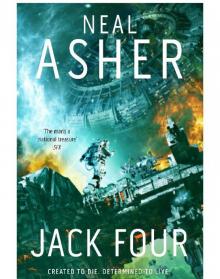 Jack Four
Jack Four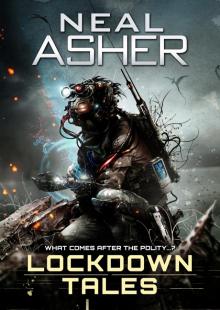 Lockdown Tales
Lockdown Tales The Warship
The Warship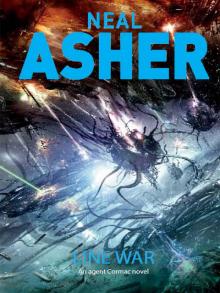 Line War
Line War Total Conflict
Total Conflict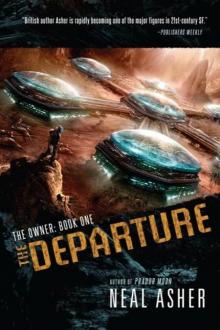 The Departure
The Departure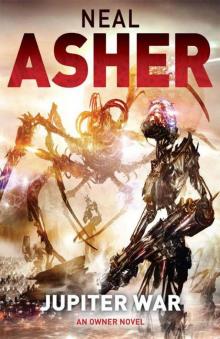 Owner 03 - Jupiter War
Owner 03 - Jupiter War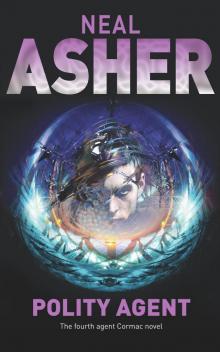 Polity Agent
Polity Agent Prador Moon
Prador Moon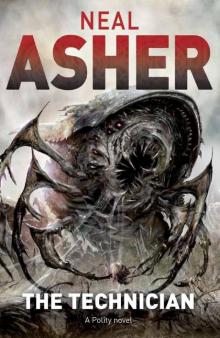 The Technician
The Technician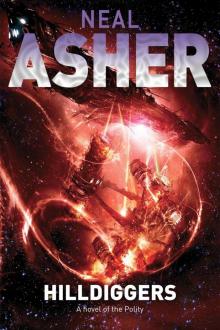 Hilldiggers
Hilldiggers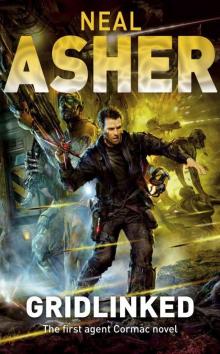 Gridlinked
Gridlinked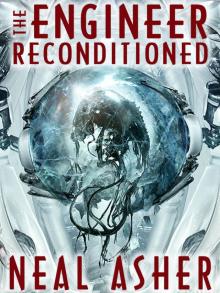 The Engineer ReConditioned
The Engineer ReConditioned Dark Intelligence
Dark Intelligence The Soldier: Rise of the Jain, Book One
The Soldier: Rise of the Jain, Book One Shadow of the Scorpion p-2
Shadow of the Scorpion p-2 The Skinner
The Skinner The Soldier
The Soldier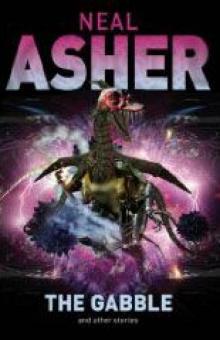 The Gabble p-13
The Gabble p-13 The Gabble and Other Stories
The Gabble and Other Stories The Parasite
The Parasite The Other Gun
The Other Gun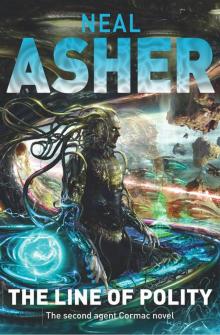 The Line of Polity
The Line of Polity Zero Point (Owner Trilogy 2)
Zero Point (Owner Trilogy 2)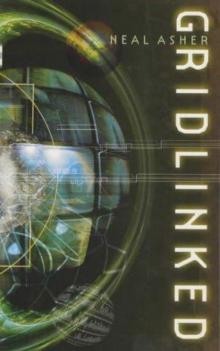 Gridlinked ac-1
Gridlinked ac-1 Prador Moon p-1
Prador Moon p-1 Infinity Engine
Infinity Engine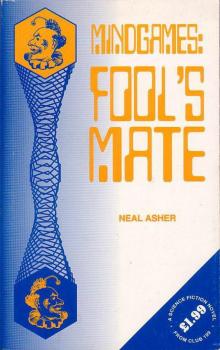 Mindgames: Fool's Mate
Mindgames: Fool's Mate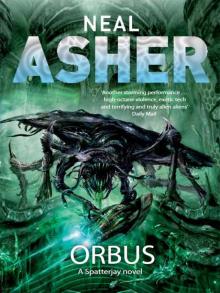 Orbus
Orbus Africa Zero
Africa Zero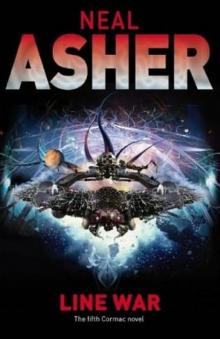 Line War ac-5
Line War ac-5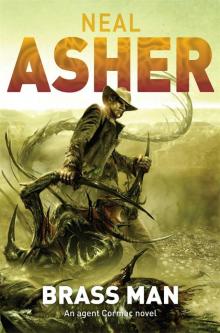 Brass Man
Brass Man The Departure to-1
The Departure to-1 Cowl
Cowl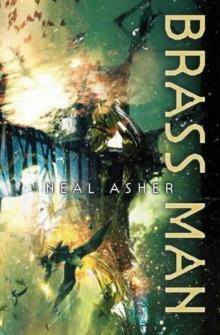 Brass Man ac-3
Brass Man ac-3 Hilldiggers (polity)
Hilldiggers (polity)![Greg Bear - [Eon Trilogy 1] - Eon (rescan) (v1.0) Read online](http://i1.bookreadfree.com/i2/04/08/greg_bear_-_eon_trilogy_1_-_eon_rescan_v1_0_preview.jpg) Greg Bear - [Eon Trilogy 1] - Eon (rescan) (v1.0)
Greg Bear - [Eon Trilogy 1] - Eon (rescan) (v1.0) The Skinner s-1
The Skinner s-1 The Voyage of the Sable Keech s-2
The Voyage of the Sable Keech s-2 The Line of Polity ac-2
The Line of Polity ac-2 War Factory: Transformations Book Two
War Factory: Transformations Book Two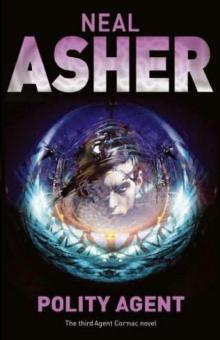 Polity Agent ac-4
Polity Agent ac-4